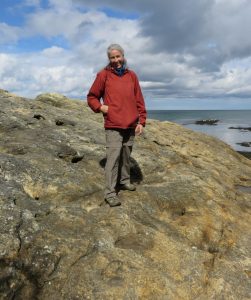
Straw Dog Writers Guild member Carla Cooke lives in Northampton, Massachusetts, and enjoys the local writing community. Following a weekend writing retreat in 2012, she began facilitating small writing groups in her home. A longtime journal-keeper and compulsive proofreader, she provides line-editing services and “a fresh eye” for other writers.
Journal: March 21, 2020
It’s a new world.
This will change most everything.
Perhaps we’ll learn to take nothing for granted.
We want to know what will happen next—
but no one does.
No one can.
When did we become so attached to knowing what’s ahead?
We’re driven by the need to know—and control—
what’s around us, the future;
believing we can is
hubris and
illusion.
It’s been said that time is an illusion. I don’t remember a time like this before—even as a child in school, I remember thinking that Christmas vacation was ten weeks long, instead of ten days. Now, amidst generalized anxiety, the hours, the days, pass gently by. Truly, they always have—but now they’re not so packed with activities and interactions as before these dire weeks began, before news started trickling in that made us lift our heads and pay attention to something wider than our own small lives.
For some, boredom stands close by. I’ve never been easily bored; formerly scheduled to the hilt and now sequestered, I’m still interested in way too many things. The list of cultural and community events in this area—an embarrassment of riches—was extensive. For me, it was exhilarating: a smorgasbord of lectures, workshops, readings, discussions, concerts, plays, and on and on. Now everything has been cancelled or postponed.
Yet here I am, still busy with a burgeoning list of near-term tasks (tax returns, the census, yard work) and long-standing ones that have waited for my attention for months, years, decades. It will take considerable effort to shift away from close-at-hand diversions toward non-urgent but important projects, like sorting through the mountains of paper I’ve retained (from unsolicited mail most people wouldn’t even open before recycling, to important documents I would be hard put to locate if I actually needed them). Maybe there’s a silver lining to this situation’s many and serious downsides: I have untold numbers of days of more or less unscheduled time. Perhaps, however, the issue will come down to self-discipline.
We have different concerns now—whether store shelves will be empty, how to stay apart and wear masks to “flatten the curve,” ways to keep our spirits up and maintain relationships. Having to remain at home may end up being the least of our worries. However, in my new more-or-less-daily walk, I’ve observed that an outdoor community has sprung up. Folks are outside (singly or in pairs, with or without dogs), and they take time to talk with one another—at least six feet apart, of course; “social distancing” is a term most people around here had never encountered a month ago. As people pass by, they interact, exchange stories or information, and introduce themselves to new acquaintances, thus building an expanding web of connection. It’s becoming a community of caring and generosity, cooperation and kinship. I wonder whether this fellowship will last beyond this pandemic, or if it is just a passing phenomenon, a consequence of these strange times.
